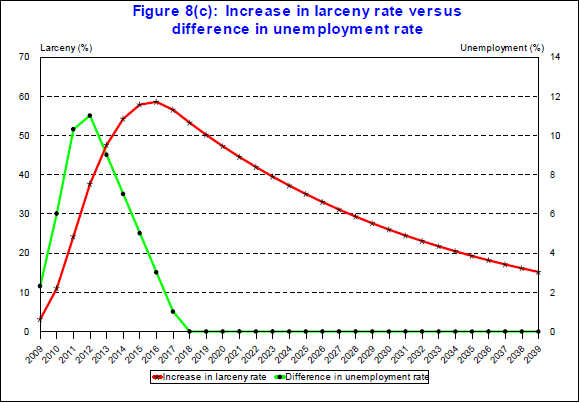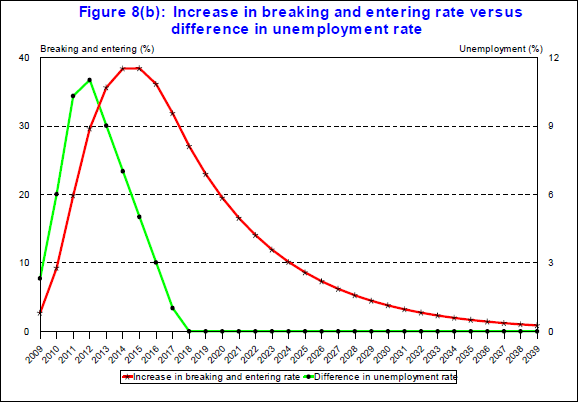Last night, any hope of a recovery was dashed in the U.S. with the latest release of unemployment data. June saw 467,000 jobs axed and the unemployment rate hitting 9.5%. The New York Times wrote it was “a sobering indication that the longest recession since the 1930s had yet to release its hold.”
Back home in Australia, the Government continues to revise up unemployment forecasts. Some economists forecast about a million Australians will be unemployed by the end of 2010. No doubt, all eyes will be on the labour force statistics for June 2009, due out from the ABS on Thursday.
But what will unemployment do to crime rates and should Australians be preparing for this coming wave?
The relationship between unemployment and crime rates is complicated and the predictions from criminologists mixed. Some studies on the last recession found crime rates actually went down – not up.
Crime is a young person’s game. To be precise – males aged 15 to 34. They are also not likely to offend immediately after they loose their jobs. As unemployment takes it toll and it becomes harder to find work the longer they are on the dole queue, individuals may turn to crime to generate an income or if they feel the system or sociality has failed them.
For this reason, the increase in crime lags the unemployment rate. The strength of the link between crime and unemployment rates appears to depend greatly upon the length and depth of the recession. The longer and deeper it is, the worst the crime rate will be.
This link doesn’t stand too favourably for our current recession. It’s going to be one long and deep recession. The level of debt and the size of the asset bubbles is not something that will past us by quickly. It will take years to unwind.
The National Institute of Economic and Industry Research have recently released a report titled “The global financial crisis: Projections of property crime rates”. It attempts to make forecasts for robbery, break and enters and larceny rates from data going back to 1979. The results are scary.

Based on unemployment spiking just over 10% in 2011, we can be expected to see crime rates accelerate at an alarming pace and peak during 2014/15. Break and enters are forecast to increase by just under 40%, and larceny rates increase to just under 60%.

But while these predictions are based on historic data, advances in electronic security and the reduction of prices may act to counter such a surge in property crime this time around.
While burglar alarms have been a common fixture in many homes for years now, many owners relied on the ear piercing screamers and the neighbours to herd off the intruders, rather than pay the recurring costs of monitoring.
Today, we have never been more connected. Most houses and businesses have always on internet access and many of us carry internet enabled phones. While 24/7 monitoring will always be the preferred choice, IP (Internet Protocol) enabled burglar alarms and mobile phone diallers allow the money tight scrooge (during a recession) to monitor the alarm ourselves, and with the flexibility to turn on the alarm remotely after forgetting in the panic to get to work on time.
Surveillance Cameras and Digital Video Recorders were once only the domain of high security facilities, but thanks to China they are now a real option in both the budget tight home and small business. Not only do they act as a deterrent, record and help identify intruders or vandals, they can be used to check on your home remotely using your video enabled phone. Ideal for when your alarm phones you to say a zone has been tripped.
During the recession of ’91 many apartment blocks had little to no security on common areas. While today, you can still find some multi story apartment blocks built before the ‘90s where visitors can walk straight into common areas, jump into the lift and onto any floor, most new apartments have access controlled by proximity cards. Cards are difficult to copy and can be cancelled at a key stroke, reducing the chances old tenants have copied keys or still hold them. Advances in apartment intercoms to include full colour video can also help to assist residents from letting Willy nilly into common areas.
Taking a leaf out of a Real Estate agent’s books, if you don’t have security “now is never a better time” to get some installed. It is best to take a preventative approach now, than wait and fall a victim.
» A complex link between recession and crime – Sydney Morning Herald, 13th April 2009.
» Joblessness Hits 9.5%, Deflating Recovery Hopes – The New York Times, 2nd July 2009.
